#do i think that it is also a really cool concept? ALSO YES
Explore tagged Tumblr posts
Text

Watercolor practice with Links from different links meet !
Was the watercolor practice an excuse to draw them ? Yes.
Waves is from my AU, @hyrule-library
Raven belongs to @uncanon-fates (I just love Raven, he's the best, I love him <3 also I like your AU, it's cool to see characters (Links) who don't appear in the games)
Linkle belongs to @nell0-0 (she's one of my fav characters from HW, and your design for her is cool ! Your AU's great too !)
Rail belongs to @casunnart (I really hesitated between drawing your Link OC, drawing Echo (I think it's his name?) and drawing Rail, because I love their designs, but I finally drew Rail ! And your Zelda story looks awesome !)
Lorule belongs to @heroesspirit (I just read your AU, and I love it ! The concept is amazing ! I really wanna read the next part !)
Clover belongs to @endlesschain-au (I love all your designs ! I can't wait to read your story, I'm sure it'll be great ! Also I really like your sketchy art style !)
Bunny belongs to @clowns0up-felix (I like your design for Bunny ! She looks cool ! Also your art is awesome ! I wanna draw as good as you !!!!)
Wild belongs to @minas-linkverse (Your AU was the reason I came to Tumblr ! Your story is amazing ! You inspired me to do my links meet !)
And Kokiri belongs to @chained-spirits (I love your design of kokiri, it is amazing ! Also your story is good ! And I like your art style !)
Better quality :









I'll probably draw another panel of different Links, since I couldn't draw all the characters I wanted
#zelda#artists on tumblr#art#drawing#the legend of zelda#tloz#fanart#tloz fanart#zelda fanart#chained spirits#endless chain#hyrule library#uncanon fates#heroes spirit#minas linkverse#watercolor#links meet au#links meet#linkverse
101 notes
·
View notes
Text
concept: found footage horror movie where the spooky is a vampire, but the vampire doesnt show up in the recording
#vampires#vampire#horror#Look is it silly and with modern film technique doesnt make much sense? yes#do i think that it is also a really cool concept? ALSO YES#full lenght movie that is the ballroom mirror sceen in Van Helsing 2004#I'm uncertain if the audio recroding should have the vampires voice but it's such a strong concept imo
83 notes
·
View notes
Note
So i remember an ask mentioning your mortal enemy, Felis Atra and their cats, and i thought it'd be fun to draw what Felis Atra's version of your italian dogs would be.


I think they would be called Butter Knife and Flamengo! Butter Knife is not his real name, it's an nickname given by his peers because of how harmless he is. I choose Flamengo because that's the name of Vasco's rival football team here in Brazil, so i thought that was the perfect name :)
Cat Machete was slightly inspired by the Oriental Shorthair cat because of their long noses and thin head shape.
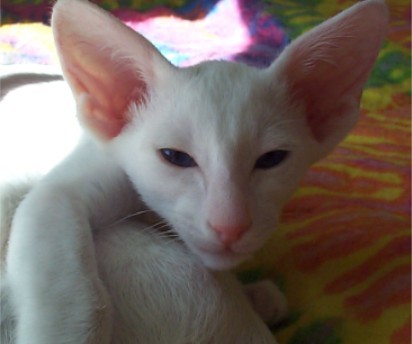
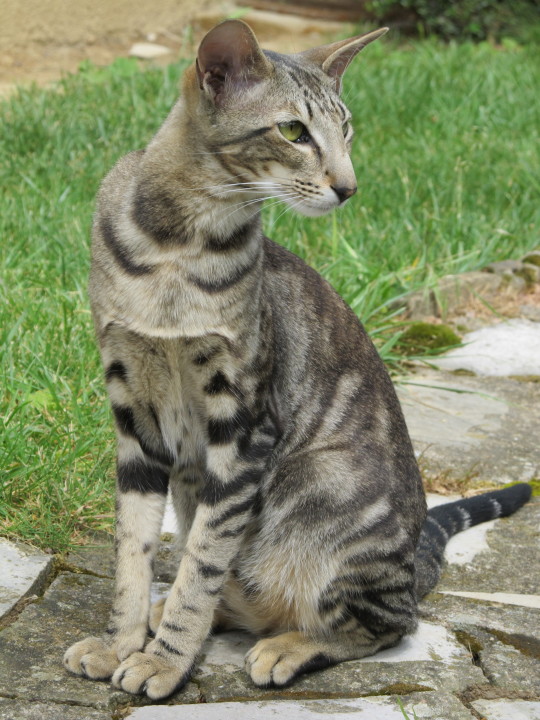
Cat Vasco was inspired by the Scottish Fold cat, because FLOPPY EARS. I gave Flamengo longer ears and orange fur to make him more like his look-alike.
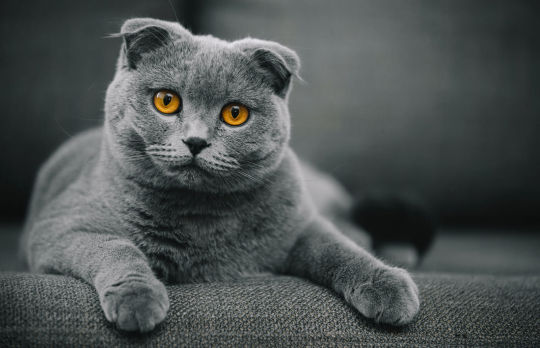

The last doodle is a reference to this ask (https://canisalbus.tumblr.com/post/728923918314946560/me-i-am-machete-ear-fan-number-1-those-ears) and contains the tumblr ask stand-in dog, whose cat version was inspired by the American Curl cat! They have round ears that are slightly floppy outwards.
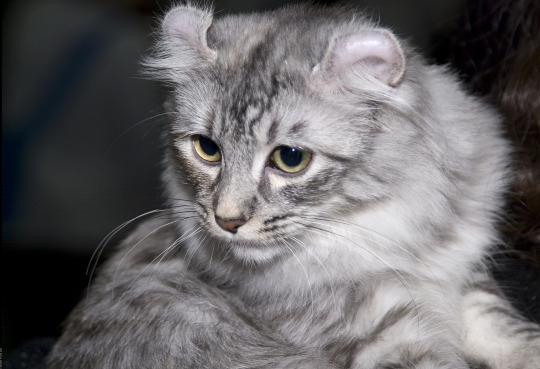
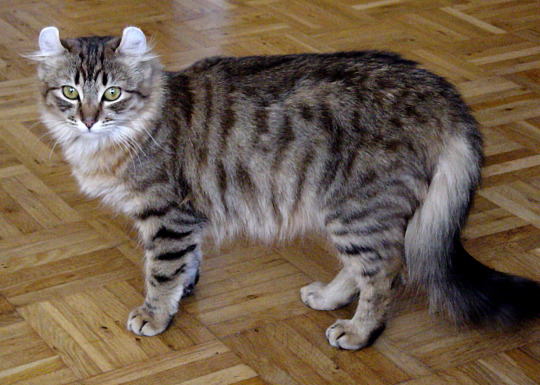
Final notes: I know cardinal clothes don't come in vibrant blue, but i was ADAMANT on switching Machete's and Vasco's clothing color patterns. I would draw the rest of Butter Knife's and Flamengo's clothes, but i suck at designing cool outfits.
Speaking of outfits, for Machete's iconic void outfit, i figured it would be fun to make it more baggy for Butter Knife, in contrast to Machete's, that looks very tight-fitted. I think it's cute, it kinda looks like a sweater. Also i can't imagine a Machete doppelganger without high heels boots, so those HAD to stay.
Oh, and just to be clear, i'm not like, claiming ownership of these guys or anything. I just thought it would be a fun exercise. Hope you like them!! I love your art and your characters.
.
#imagine if Vaschete but CATS and REVERSED -> Butter knife ;_; and Flamengo <3#this ask is from last year and I'm sorry I've allowed it sit in my inbox for so long ´m`#but I've been thinking about it intermittedly#the context was that someone said that somewhere out there existed my mortal enemy (felis atra = black/dark cat)#and they had frenzied cat ocs instead of melancholic dogs#first of all they both look so darling I'm getting radiation poisoning just from looking at them aaaaaa#and the fact you put so much thought and effort into this concept is making me go absolutely rabid#extremely strange seeing Machete with big pupils and Vasco with tiny pinpoints#Butter knife purring like a fluffy jackhammer is instant serotonin I love him#and yes if you turned Machete to a cat he'd probably be something resembling an oriental shorthair#especially one of those really exaggerated ones with giant bat ears and roman nose#and I keep visualizing Vasco as a scottish fold as well but it's kind of giving me sad bad feels personally#I can't look past their painful and debilitating health issues#the same mutation that causes the floppy ears also destroys the cartilage in their joints#it's such a shame because they're a terribly cute and charming breed#and in this case they really do have those similar rounded friendly shapes that Vasco does#if I ever draw them as cats myself I'll probably have to think of some other breed for him even though it would be such a perfect fit#also I think it's funny how you can swap everything else but Machete's heels have to stay :'> don't separate the crinkle and his boots#thank you so much! this was such a cool ask to receive I love how you designed their cat forms#gift art#dingergum#Machete#Vasco#own characters#Vaschete scenarios
331 notes
·
View notes
Text
’hikaru’ & yoshiki but theyre nennetti

cishet boy best friends behavior nothing to see here 🙈
#tshd#the summer hikaru died#hikaru ga shinda natsu#yoshiki tsujinaka#hikaru indou#yoshiki x hikaru#sardigna#idk if i should translate it#i feel like itd ruin the joke#oh well !#‘yo bro you lowkey stink like shit’ ‘what the fuck r u talking abt’ ‘yes dude u smell like u havent washed in ages’#‘oh gtfo. like what can i do abt that now ?’ ‘idk. btw not to be like gay or anything but ur literally cool (handsome) af bro’#this made me realize how many concepts n phrases can be reduced to a single word in sardinian. damn#btw. ‘nenni’ r like. the gangster wannabes of sardinia or wtvr. specifically of cagliari#idk how to translate ‘cess’ its like ‘jeez’ i guess but not really. most of these words cant really be translated accurately#im gnna try 2 translate them#oja = hey / ouch / ow / aw; nenno = i said it earlier but also technically it just means dude / bro; fraghi = you stink (frago = stink);#tagazzu ses narendi = what the fuck are you saying; eja = yes; lillo = nenno slang for dude / bro; caddozzo = someone whos unclean / unkept#bairindi = get out; intzà = various meanings but generally its ‘and now ?’ or ‘so what ?’; abboh = a variation of ‘boh’ so it means ‘idk’;#cess = cant really be translated ? most similar to jeez but not really ? variation of ‘cessu’ which is the exclamation ‘jesus !’;#‘caghinery’ = 🚬 /🚬gotry ; togo = cool / handsome & its mostly used for guys but also js in general for things#also keep in mind that i dont rlly speak a singular dialect due to my family n friends but i think everythings in cagliaritan dialect here#also bairindi can be used as a variation of ‘wtf r u saying’ n ‘go fuck urself’ ig#and eja is also just in general an affirmation. like someone could tell u ‘im gonna go now’ and u could reply ‘eja’ to mean ‘got it’
27 notes
·
View notes
Text
i hate that "let people have fun" has become such a goddamn dogwhistle word to me in fandom spaces that i have to be suspicious about people who say it. like yeah you're not wrong but half the people i've seen who use it are really weird about child characters or siblings or some shit of a similar caliber and it's like. huh. so that's why you're saying that
#YES i believe that all manners of interpretations and ideas and stuff like that are cool and people should keep finding new ways to invent#and reinvent concepts and plots and ideas#that's awesome!#i ALSO believe that these kinds of things require nuance sometimes#and there is a fine line between exploring a controversial topic and fetishizing or downplaying the seriousness of said topic#all things require nuance it's simply a matter of how much introspection you're actually willing to do and how much you think before acting#all of this is just to say the label of pro/shipper was ruined the moment people started using it for awful shit and it aint getting fixed#that was yalls own fault for letting yucky folks into your ranks and you dont really get to be surprised by that
10 notes
·
View notes
Photo






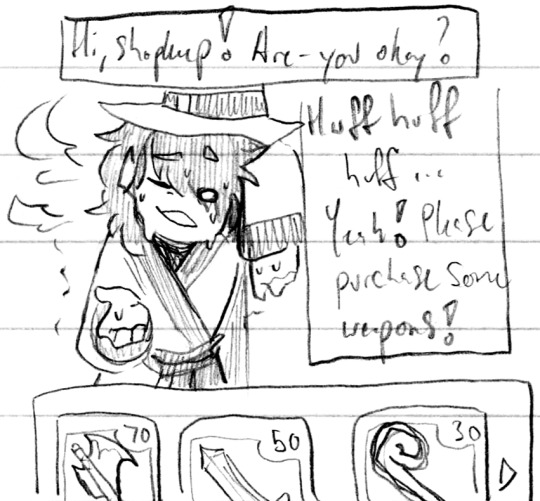
A hero is only as good as his weapons, so make ‘em count (Patreon)
#Doodles#Original#Another idea smol and I are working on together :D Been a bit!#She came up with the concept on this one and I fell in love with it <3 She's very cool hehe#If you're familiar with the game Minit it has Something of a similar premise - not the same strict time pressure but yes on the time loop#Y'ever notice how in some games it seems like the wandering trader or traveling shop seems to come upon you rather than the other way around#:3c Hm ♪ Wonder how they'd know where you were gonna be :3c#The crux is that you play as the weapons shop owner and you're responsible for supplying the hero and his team with weapons!#Except the BBEG has gotten wise to how the hero keeps defeating him and it sick of it - so the shop owner is cursed to be in a time loop!#I love the concept <3 It sounds so fun to play in and there's still plenty of room to think about the mechanics and how it would be played#As well as the art design! :D#We threw around some character concepts - she's really into Baldur's Gate 3 at the moment so of course they had some influence in hers hehe#Only got the starting party for the moment but there are plans for a full team of 4 plus the shopkeep >:3c And various other NPCs lol#A lot of the gameplay would basically boil down to being a bartering simulator hehe ♪#Very RPG trade-this-for-that style quests - under a time limit! Hehe#Since it's the type of game that pretty much requires replaying sections time-loop-style it's all about how quickly you can trial and error#And then hightail it to where you need to be lol#I think we were also tossing around a nap mechanic to skip right to the time loop reset in case you mess up a run haha#I gotta get back to Majora's Mask at some point I swear#We still have a good bit of concept work to do on the art side of things - she's also been really into pixel art lately and I love pixel art#I also managed to pick up a full release of one of the RPGMakers :D So that's an exciting possibility!#I haven't learned most of its ins and outs yet but I do know About importing custom assets at the very least >:3c#Same with Novelty and I haven't done that yet either lol - all in due time! I hope!!
12 notes
·
View notes
Text
no. polyamory would've solved a subplot of s3 and the entire main crime plot of s4. this is the truth
#oh hes fallen into madness and talking about babylon berlin again#<- you probably. reading this#but fuck man esther weintraub and edgar wouldve made an Amazing throuple im just saying#weintraubs last words being fucking. what can i do i loved him#DUDE maybe you shouldve DONE SOMETHING ABOUT THAT#the whole love betrayal didnt quite sell though imo. like its a classic cool concept but the rivalry just. idk i didnt entirely feel it#i also didnt really feel their deep emotional connection like weintraub just showed up in s3 and there was almost Immediate conflict#yes i do still think they were gay in love but. this couldve been done better#also esther saying she wanted both edgar And weintraub not either one is just. you GET it#if she gets that hollywood job ill be so happy for her like get OUT girl#she & svetlana hands down the coolest characters in this show (i miss svetlana)#babylon berlin#esther korda#walter weintraub#edgar kasabian
7 notes
·
View notes
Text
Late Night with the Devil feels like a V/H/S segment that escaped captivity
#dumb stuff#horror movies#late night with the devil#yes i saw it. it was at a cult movie showing so i felt a little better knowing i was at least giving money to the theater#they do a bunch of cool special events and show movies that are hard to see#also they have booze 😎👍#still stewing on this. take the v/h/s comment however you like#i love the v/h/s movies but they usually get reeeally weird or nasty or both and that's why i like them#lnwtd gets surreal and weird by the end but the costuming and effects kind of make it feel corny#and you think with a concept like this that the gore would be crazy too. not really? there's a face melt but it's hard to see and kinda bad#also it just. stops. it starts with a documentary introduction but drops it immediately - no follow-up whatsoever#at least Dastmalchian was great. put him in more horror movies (and anything honestly) immediately
8 notes
·
View notes
Text
mob psycho(logical horror) 100
#Chatterbomb#There are some terrifying concepts in there they should be stretched more#That comic reminded me of junji itos The Long Dream#I’ll have to do a rewatch and write some stuff down#The mental prison stuff? Terrifying 10/10#Shigeo in fabricated world for six months is terrifying but I feel like being trapped in a static environment that only gets longer even#Though real world time has barely passed and you are all alone and you can’t escape and you can’t change the environment besides clawing at#The walls#day and night don’t pass with the sun and moon but your body is aging anyway#Nothing changes and you are running out of resources.#How long until you accept no one will come and save you? How much are you willing to starve while waiting for someone who left?#What if the world that trapped you won’t let you die? Starving for centuries without a sign of life#Thinking at some point you must have escaped. Or was it a dream within a dream? Can that happen? How many times have you fallen asleep?#How many dreams deep are you already in?#WHAT IF HE STARTED ROTTING#what if he was living in his own dead body!!!!! Would that be fucked up or what!!!!!#Something about reigen sparks a desire to see him experience pain disconnected with reality#The dreams in train hell are only getting longer. None of them are peaceful. He can’t tell if his hair is greying from aging or how much th#Dreams take a toll on him. How much time has really passed? Can he even rely on how his body is changing? Is it truly time who is#Responsible? Or is it him? Or the train itself?#What if all they found of him was a dryed up body with a beating heart and pulsating brain. Laying limp and clothing scattered#If I really indulge myself the scratched out days. When looked at from farther away. Still marking the potential days reads#Abandon all hope#ye who enter here#Which yeah that’s stretching into being ridiculous but it would be cool TO ME#Dante’s inferno you are so silly and special to me#I got really autistic here but <3 big fan of horror huge fan of suffering <333#ALSO!! taking inspiration from “heck” short film but the days might be counted by “sleeps” as time cannot accurately be measured in a place#That defies universal law#Ok I think I’m done now ok I’m normal probably
5 notes
·
View notes
Text
dc is doing a little mini relaunch after the current crossover finishes and honestly thank god because literally only two of their current ongoings interest me but there's a bunch of fun looking stuff happening in november that i might actually look at. and also it's starting series for several guys who should have had ongoings this whole time like the fucking JUSTICE LEAGUE
#i.e. black lightning JSA question batgirl. and i'll keep up with justice league now that they actually HAVE an ongoing#insane that it just wasn't happening for so long. why did they do that.#now i might actually take an interest in the mainline crossovers if there's a series that they're actually building from#then again. if it's crap i probably won't stick with it#but like marvel has three avengers books running concurrently CONSTANTLY. and yet dc hardly ever has justice league stuff going on#a team book is just. the obvious place to do all that stuff. cos i'm not reading batman i do not CARE about batman#but the new justice league has flash and black lightning and martian manhunter and other guys who i think are cool outside the Trinity guys#also i'm thinking i'll have a look at the 'absolute' universe. yes we are pointing and laughing at the batman design but it seems like an#interesting concept. and also extremely funny that they're going oh fuck marvel relaunched ultimates we have to do something like that too#but actually looking at the ACTUAL premise of the thing. it's more about making an extremely stripped back version of each character#designed to be at their lowest with no support systems in place#idk how it'll turn out. might be too edgy and angst filled for my tastes.#but it looks worth a look#for the record the two series i'm actually readign currently are poison ivy and the flash.#flash i'm actually collecting (i got in when it started and am yet to be disappointed)#lily dot tee ex tee#my pull list is getting so long. and my actual pull list of comics i'm buying is getting a bit much too#but i do not regret impulse subscribing to The Power Fantasy having just read issue 1. it's INCREDIBLE.#i've stopped getting ultimate x men tho. was good but i don't think really worth the money of getting it physically. i'll just pirate.#and tbh the current dr who run is eh. and also only a 4 issue limited series. but it's dr who comics of course i'm collecting it anyway.#immortal thor is a thousand times worth the money tho holy SHIT that book is SO GOOD and i'm SO GLAD i'm reading it physically#sorry i don't comicspost often but i had. a lot of thoughts.
3 notes
·
View notes
Text
sorry to ffxivlovepost always anyway Man the way the devs & game did so good in making an mc that is Basically a blank-slate for the players, and there's so many opportunities to make your oc However you like but. the game itself adds so much story and character to that blank-slate guy. amazing
#⋯ ꒰ა starry thoughts ໒꒱ *·˚#⋯ ꒰ა ffxiv ໒꒱ *·˚#i think abt this a lot. and also a lot of other ffxiv stuff LMFAO#it's amazing ..... drk is a huge example of this i think#bcs it plays into the guilt and whatnot the wol feels and all that. spectacular#endwalker !!!!! shadowbringers!!! the way the game uses the concept of hope is just always so beautiful and fascinating to me#and yeah bunch of games may have like. mc you create & design but not always can you like. ehvejfhsjf idk how to explain LOL#it is 4 pm i woke up 2 hours ago but priorly woke at 7 am after havingn a rlly. weird sleep.#to which my twin told me 'i wont tell u what time it is' as we went to sleep so it def was Really late#bcs we were going thru re2 and she was also playing games on steam i've been telling her to play#(to which i got her fav characters right and knew fr how'd she'd like the game LMFAO. twins amiright.)#actually that is also smth so fascinating to me bcs. i always have had someone w me in my life. i am literally never alone.#to which what i'm getting at here is Wow... it's like having a sleepover every single day. and i was a kid always sad never to have#sleepovers bcs my parents were strict (they r cool tho!) but i was a kid who wanted to experience all the kid things#but i didn't rlly but that's fine :P i am a grateful person LOL anyway back on track back on black#ffxiv... the game that u are.....#it's the 1st game that rlly actually made me invested in the ocs of others and also make a fully fledged oc that wasn't just originally mine#but for a fandom or something. and also it got me back into writing and Into making poetry and prose so. yeah.#it's amazing how much. oc x canon ???? yeah. ffxiv is so Wow#like eveyrhhting w themis or graha and how u can AAGGGHHH shit w your oc . so many possibilities#and that character. those possibilities. are already in game but also expanded by the player and the fanbade and#idk it's so beautiful to me WHAGHSGDJDH. and yes me saying themis or graha up there is self-indukgent bcs#both of them are so Insane it's so. insane!!!!! i will never forget what happened in abyssos in particular that Broke me#and anabaseios... :)) i cried so much it is almost embarrassing. and wow. asphodelos. wverything w themis just. yeah#anyway graha... self-explanatory if u know..... idk he's the character of all time to me. simply said. but themis is crazy bcs going thru ab#yssos made me think for a bit 'hey themis might be my fav character in ffxiv now' but No but also Wow. wow#kinda cute bcs me and my twin have a thing where she has a certain type of chara she likes and me too#so sometimes. most times. all times. we have our own characters we like anyway but sometimes they overlap but either the case we kinda#lowkey 'segregate???' idk if that is a good word but we do that w our fav characters. so like emet is her fav elidibus is mine.#and that was all the way in arrr alr and we barely knew spoilers so that's kinda crazy! anyway
5 notes
·
View notes
Text
.
#periodical life updates#(<- NUMBER 3!!!) I FINISHED THE ANIMATION AND EVERYTHING FOR THAT PROJECT AND SENT IT OFF! super excited!!#it looks really cute! i tried my best and im mostly satisfied of where i landed <33#it's my little sibling's birthday today!! it's also the first official meeting of lgbt club!! (the other event was a fun lgbt mixer)#my backpack smells bad. like mildew or mold maybe? urgh its awful and gives me a headache. i might need a new one. i dont know. urghhh.#my programming homework is due today!! yike!! but other than that my personal projects with deadlines are all done!#INIQUITY NOW THAT YOU HAVE TIME ARE YOU FINALLY GONNA WORK ON YOUR SELF SHIP BLOG?? YES!! HOPEFULLY!!#truthfully i /have/ been working on it on the side. it looks decent but the colors;;; i have always been pretty sht at color picking?#i can adjust with filters but without that im like. a little not good yet lmao. gotta do some studies sometime perhaps#BUT YAY EXCITED!! ive got some rambles and doodles and a tag system and f/o info which is extremely cumbersome (affectionate)!!#also i have new fandom ocs for the latest dimension 20 campaign and im so delighted heho <33 this campaign is literally so fun.#im watching it with my sibling when its done!! OOH ALSO I FIGURED OUT HOW TO PNGTUBE AND i will likely never use it BUT COOL!!#i dont like. talk. lmao. my art streams are 1) silent 2) rare 3) only shared with my siblings. pngtuber is a little useless. but CUTE!!#i got boba tea yesterday!! sandy bought it :3 <3 and we're having pho and cheesecake later and i might plan out a little excursion today?#like i might get a treatsie. OR i'll just sit on campus as usual and get a mango smoothie and draw for a while (or work on homework.)#(lets be honest its likely the former. i might get a little back into traditional? ooh or maybe i'll practice my asl?) HEY THOUGH.#ive been thinking about making a henrey stickmn (ask)blog to practice asl? like. no plot. just henry teaching ellie and charles asl#really funny considering my Real concept of an askblog for THSC. not ace or eca; but a secret third thing (⛎) ;)#then again since when have i EVER followed through on an askblog lmao?? damb im all over the place today. we're already hitting tag limit#okay!! 3 AM!! if im going early tomorrow i gotta eep! goodnight everyone i love you!! see you tomorrow if i have the energy and time!!
7 notes
·
View notes
Text
16 classmates means 256 potential dynamics to explore if we only consider 1 on 1 interactions (which i will! ...until this sentence ends) and that means 256 drawings. considering that group interactions exist and it can be any combo that is... a way larger number.
i have 2 hands, 0 time and too much ambition!!
haha! oh no.
#i would like to live my life and also fundematally tear apart my hpfxtn from the inside out and roll in its guts#that's not really possible unfortunately#because TIME#bitches love to hate on me for “quality over quantity uwu” which is valid as FUCK babe you do you#i need to do me and me wants to be engulfed in the concept of interaction. yes specifically through ship art.#that means gotta go fast.#as in. i get told a lot i should not try to improve my drawing speed because i draw fast enough. they fail to consider that i want to!!!!#my brain is an enigma to me too im a barely functioning human if me having social competence comes in the form of free art then#my therapist is gonna make so much fun of me i guess#/lh#mind you. this here talking to myself? this is all silly bullshit ego. i know very well whatever i WANT to do ill end up drawing koquichechi#“ok me we made a plan to practice drawing subtle understated emotions with charact-” “what if we drew koquichechi slapstick instead”#“but the PLAN??” “look at that. it's koquichechi.”#and then i babysit myself into FORCING myself to draw shit i want to draw and would enjoy drawing but it takes SO LONG#an doing things that take time *takes time*. outrageous. how dare you. i hate it. (bla bla bla time is an illusion i KNOW)#and im still figuring out subtle. groooooaaaaaaannnnnnnnn!!!!!!!#eh whatevs!#whether i make ANY of my bullshit projects real or not what matters is having fun with it before i die /lh#its gonna be okay#*yearning* i just think itd be cool!!#shut up maiora#rambling#i get threatened with violence constantly by art friends. they're so completely right.#anyway tell me all about your rare-pairs if you want!! i might scribble em in my free time :>#(use the ask box)#(yes platonic too!)#(i think itd be fun 👉👈)#(i wanna hear people's thoughts!!)#(might be done in pencil ^^')#(im getting distracted HAVE A NICE DAY BUHBYE)
17 notes
·
View notes
Note
Yeah that’s all true and you make great points. I read your headcanon before they’re cool. You know I wonder how it’d look if the cousin met a koopaling?
Oh I would LOVE to see her meet the Koopalings??? I wanna imagine they are her brand of Weird Kid, she'd get along great with them for sure.
The Koopalings don't have explicitly canon ages, I think the closest we get is the implication you fight them in age order in Mario Bros 3, starting with Larry and ending with Ludwig
With that in mind my current headcanons are as follows;
Larry - 11-12
Morton - 13
Wendy - 14-16
Iggy - 16
Roy - 16-17
Lemmy - 17, but born on February 29th on a leap year, so he instead claims to be 4
Ludwig - 18
Oh and Bowser Jr is elementary school age in modern Mario games, so like 7-8? He was, at most, 6 in Sunshine. In my head anyway.
As for Mario and Luigi's little Cousin (who I call Louise), I think she's probably 11 or 12. She'd kinda small but so is the entire Mario family, Mario himself especially, so she's probably just kinda short for her age.
I would looooove a Super Mario Super Show Reboot with this Mario family, and an entire episode on Louise in the Mushroom Kingdom.
Maybe Mario and Luigi have to watch her for a day, and really just can't keep her entertained. There's no service in the Mushroom Kingdom so she can't play on her phone or text her friends either, and eventually wanders off in frustration and into a Warp Pipe that takes her to Bowser's Kingdom
She ends up hanging out with the Koopalings, Jr. canonically plays a lot of video games so they must have consoles in the castle. She and Larry are the same age, so he's like her way in to the castle to meet everyone. Weird little kid connections.
She'd think Wendy is sooo cool and pretty, and she clearly loves destruction if her reaction to the Earth Quake before Bowers's Castle crashed into Brooklyn is any indication, so she'd love the chaos Morton and Lemmy get up to, and probably the mad scientist nonsense Iggy does as well
Maybe she's a little jealous the Koopalings are so far apart in age, but still so close. Maybe she vents a little to Roy and Ludwig about how Mario and Luigi wave her off as a nuisance, how they're so close without her, while chucking little rocks into a lava pool.
Roy would comfort her about it, offer genuine advice. He's a good kid. Ludwig, who was just planning on holding this kid hostage to get back at those stupid Mario Brothers, would eventually cave under the genuine emotion in the room and just like. Awkwardly pat her on the back?? And throw in his two cents, maybe admits as the oldest he also has trouble keeping up with Jr and even Larry sometimes, but he still loves them very much.
At the end of the episode she heads back, with all the Koopalings in her phone contacts, and idk maybe following Wendy's Instagram/TikTok, and gets half tackled by the Mario Brothers who were so worried when she disappeared. When they find out where she was they go into full hysteria.
#Do I have half plots for a New Super Mario Brothers Super Show written in my head?#Mayhaps#With childish lessons for the younger audience sense Nintendo very clearly wants Mario to be for New Gamers?#Perchance#Did I think for a very brief moment while writing this what if Larry and Louise ended up dating?#Yes absolutely actually it's a little bit of brainworms#Because the concept is EXTREMELY funny to me#Mini Bowuigi#I really really REALLY want something to expand on the Koopalings more#Sense the last big of character we got for them was before they had canon names and personalities#They're SUCH cool characters I wish to expand on them#And I also wish to expand on the Mario family#So why not both at once#Thankyou for asking#Ooooooh we're brain worming tonight besties#Thankyou bestie for the asks so I may say my think thots out loud I love to think thought about these pixels like a LOT
6 notes
·
View notes
Text
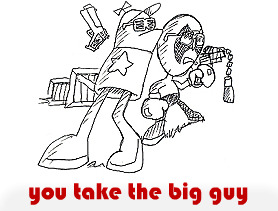
[image description: black and white sketch. dangeresque, further in the background, points his nunchuck-gun forward in a wide stance. dangeresque too, in the foreground, leans back on his feet & points his own gun in the air. they both look seriously to the right at an unseen target. at the left are some crates in the background. the caption is red, blocky & curvy text, reading "you take the big guy". end image description]
i honest to god put more stock into the relationship between these double-fictional characters than sb & hs themselves sometimes
#the implications man the implications#i read that one comic yes and i think the honest to god nice level the dangeresque two's relationship is built upon is. so fun#i will analyze that in another post. this post is for me to say. i really like it#god what if i wrote a story. see i really like the idea of stories where sb has to confront the beings from his own creations#in a messy & extremely freudian manner#so one where he meets up with the cast of dangeresque would be fun to make. i can imagine it#if cutsey/sultry buttons craig & strong sad's misc brother characters are any indication there is a good deal of actor influence#in the cast's realization as characters. i mean like bubs & the kot & pom pom & the poopsmith play their parts pretty straightforwardly#but let's face it. sb can come up with very nice concepts but he can't do super varied character types.#the rest of the cast are responsible for much of the variety in the actual character trait department. he makes up the drama fine#okay i said i wouldn't do analysis in this post. my point is a fcusa/dangeresque cast meetup would be interesting#because some of them are direct strong bad products & there'd be some people dealing with#yep yeah i figured out that's how sb views me while i was playing that character. or even just yep i'm not like that at all#meanwhile others would be like man it sure is nice how i'm not actually like that but it kind of hurts how sb views me so#and yet others would be like say strong bad since dangeresque & dangeresque too are getting up to some stuff right now#wouldn't it be so cool if we also did something. so that they could see their progentitor-types have also got epic things going on#god ask me about this again at a time not so late at night okay. and also once i've had more time to think about it
2 notes
·
View notes
Text
my current stories
Two stories I’m collaborating with reggie on, can’t say anything about them but noting this for myself
main four story — gay, many characters, plot has gone out the window at this point, co-creating with reggie on team, I’ve lost interest (got too complicated, too much going on….. chrs r my children & I love them but… *sigh* who knows what’ll happen, maybe I’ll split the story up idk)
homura’s odyssey — literally the only thing with an official title, multifandom crossover, au of putting characters in situations, vague plot (hyperfixation hell)
gay tragic thing — using old ocs Thomas & Milo, started with poetry/song lyrics…supposed to be a music album (might never happen as that)
And ofc any random idea that appear in my head
OH YEAH
the other thing…. Lego movie fanfic inspired by epic the musical (can u tell it has a grip on me? This is what I get for being a Greek mythology kid)
#ghost-rambles.txt#Yes main four story is the actual placeholder I use; in my defense used to only be about 4 characters#I think M4’s main issue is that it has too many separate ideas trying to combine into one major thing#And also…#Like it’s fun but it’s also….#I’m not sure how *me* it is anymore?#Like overarching concept is kinda cool but…#I like having fun with my stories but I haven’t really been having fun with it in a while#Welp imma go think about that for a while#Maybe in doing that I can think of some short story idea to write at some point ¯\_(ツ)_/¯
0 notes